
The Essential Glen Campbell Volume One is the first of a series of three albums which cover Glen Campbell's recordings for Capitol Records between 1962 and 1979. The tracks are presented in a non-chronological order. All three Essential CDs contain, next to single and albums tracks, previously unreleased recordings. On The Essential Glen Campbell Volume One, these are "Twelve Blues", "I Walk the Line" and "Blue Sky Shining", from a 1979 recording session led by Nelson Riddle. The Essential albums are also notable for containing some of the songs from The Artistry of Glen Campbell, the only original studio album by Glen Campbell that has not been released on CD or as a digital download. Included here are "Banjo Garden" and "Shenandoah".

The Essential Glen Campbell Volume Two is the second of a series of three albums which cover Glen Campbell's recordings for Capitol Records between 1962 and 1979. The tracks are presented in a non-chronological order. All three Essential CDs contain, next to single and albums tracks, previously unreleased recordings. On The Essential Glen Campbell Volume Two, these are "My Special Angel", an uptempo version of "Last Thing on My Mind", "Oh Boy" and "Don't It Make You Want To Go Home". The Essential albums are also notable for containing some of the songs from The Artistry of Glen Campbell, the only original studio album by Glen Campbell that has not been released on CD or as a digital download. Included here is "Greensleeves".

Reunion: The Songs of Jimmy Webb is the twenty-seventh album by American singer and guitarist Glen Campbell, released in 1974.

Wichita Lineman is the eleventh album by American singer-guitarist Glen Campbell, released in 1968 by Capitol Records.
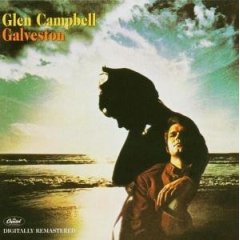
Galveston is the twelfth studio album by American country music singer-songwriter Glen Campbell, released in March 1969 by Capitol Records. The album was a major hit for Campbell, reaching number one on the Billboard Country Albums chart, and generated the number one hit single on the Hot Country Singles and Easy Listening charts, "Galveston", written by Jimmy Webb, who also wrote the follow-up single, "Where's the Playground Susie", which peaked at number 28 on the Hot Country Singles chart and number 10 on the Easy Listening chart. The front cover is a photograph of Galveston Beach, Galveston, Texas.

Live at the Royal Festival Hall is the third live album by American singer-songwriter Glen Campbell, released in November 1977 by Capitol Records.

Hey, Little One is the eighth album by American singer-guitarist Glen Campbell, released in 1968 by Capitol Records. The single "I Wanna Live" became Campbell's first number-one hit on the country charts.
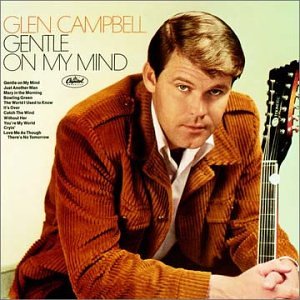
Gentle on My Mind is the sixth album by American singer-guitarist Glen Campbell, released in 1967 by Capitol Records.
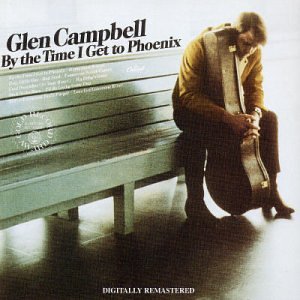
By the Time I Get to Phoenix is the seventh album by American singer-guitarist Glen Campbell, released in November 1967 by Capitol Records.

A New Place in the Sun is the ninth album by American singer-guitarist Glen Campbell, released in 1968 by Capitol Records.

Burning Bridges is the fifth album by American singer-guitarist Glen Campbell, released in 1967 by Capitol Records.

The Glen Campbell Goodtime Album is the 19th album by American singer/guitarist Glen Campbell, released in 1970.

Anne Murray / Glen Campbell is an album by American singer Glen Campbell and Canadian singer Anne Murray, released in 1971. The album contained both new material, and duet versions of songs each artist had recorded individually, as well as an early version of "You're Easy to Love", which later became a hit for Hank Snow, the standard "Canadian Sunset", and Brotherhood of Man's 1970 hit "United We Stand".

Try a Little Kindness is the thirteenth album by American singer/guitarist Glen Campbell, released in 1970. The title track was one of Campbell's favorite songs.

Norwood is the soundtrack album by American musician Glen Campbell from his 1970 film Norwood. The album was released by Capitol Records in June 1970.
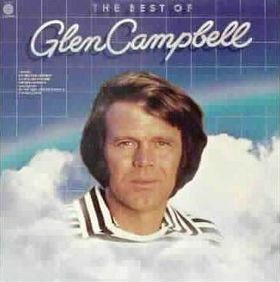
After Glen Campbell's Greatest Hits (1971), The Best of Glen Campbell was the second of official Capitol compilation albums by Glen Campbell and was released in 1976.

Glen Campbell's Greatest Hits was the first official Capitol compilation album by Glen Campbell and was released in 1971. The Best of Glen Campbell followed in 1976, covering his later hits in addition to five on this compilation.
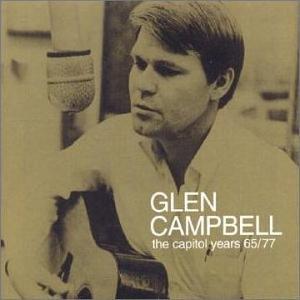
The Capitol Years 65/77 is a compilation album by Glen Campbell, released in Europe only on February 22, 1999. The double CD set contains previously released, single and album tracks that Campbell recorded for Capitol Records between 1965 and 1977.
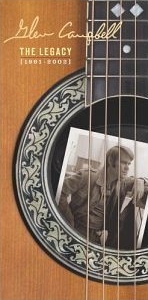
The Legacy (1961–2002) is a boxset covering four decades of recordings by Glen Campbell. The fourth CD is a compilation of live recordings.
American country music singer Glen Campbell released fifteen video albums and was featured in twenty-one music videos in his lifetime. His first two music videos, "By the Time I Get to Phoenix" and "Wichita Lineman", were directed by Gene Weed in 1967 and 1968 respectively. Campbell released his final music video, "I'm Not Gonna Miss You", in 2014 to coincide with the release of the documentary Glen Campbell: I'll Be Me.



















